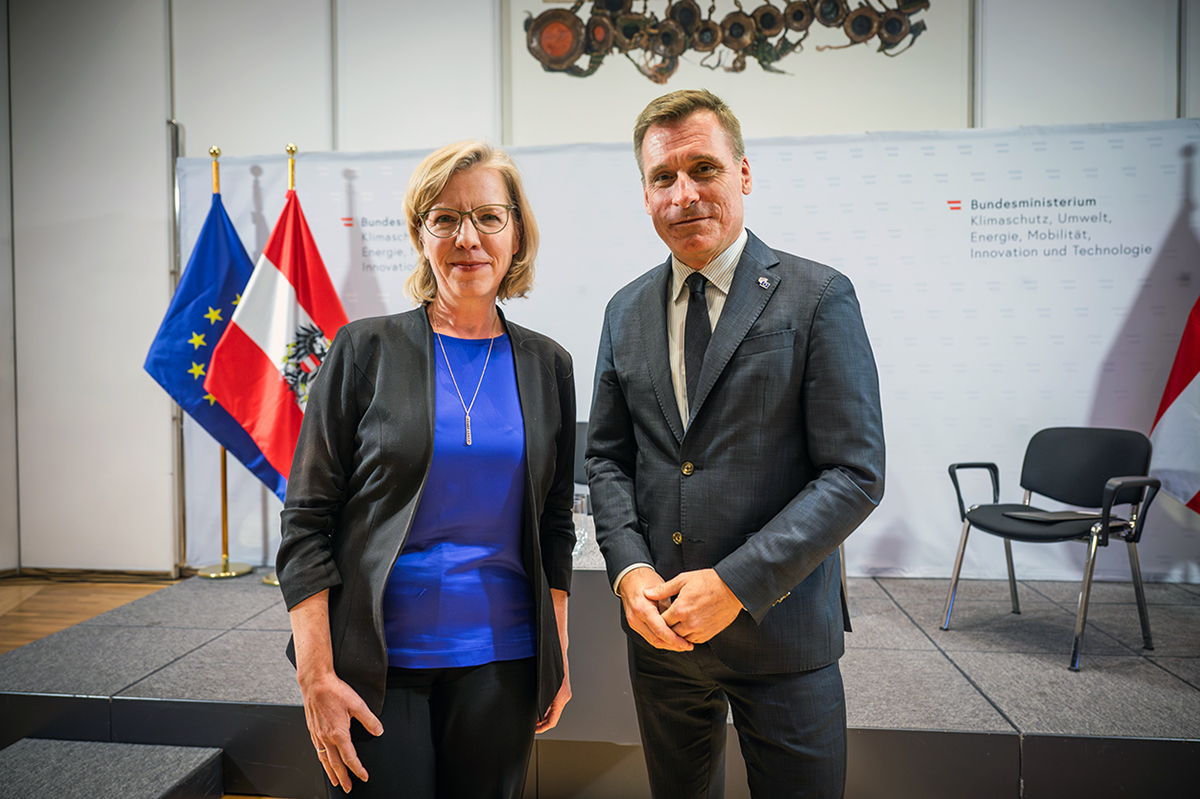Just Transition Konferenz des Klimaschutzministeriums Konferenz im Klimaschutzministerium betont Bedeutung sozialer Klimapolitik
Austausch zur Gestaltung einer "Just Transition" mit Klimaschutzministerin Leonore Gewessler und Oliver Röpke, Präsident des Europäischen Wirtschafts- und Sozialausschusses.
Am heutigen Freitag fand die Just Transition Konferenz des Klimaschutzministeriums statt. Zentrales Thema: die erfolgreiche Gestaltung einer sozial gerechten Klimapolitik.
Eine wichtige Rolle spielen dabei die Aus-und Weiterbildungen von Fachkräften in klimafreundlichen Berufen, sogenannten "Green Jobs". Mit der Umweltstiftung hat die Bundesregierung bereits im Jahr 2022 ein Instrument geschaffen, um langzeitarbeitslosen Personen eine zukunftsfitte Ausbildung zu ermöglichen. Bisher stand dafür ein Budget von 17,5 Millionen Euro zur Verfügung. Klimaschutzministerin Leonore Gewessler kündigte im Rahmen der Konferenz die Erhöhung des Budgets durch das Klimaschutzministerium an, um 7,5 Millionen Euro auf 25 Millionen Euro. Ziel ist es, bis 2025 1.000 Menschen in die Stiftung aufzunehmen.
Ein weiterer Themenbereich auf der Konferenz war die soziale Gestaltung von Klimaschutzmaßnahmen und einer Energiewende, die niemanden zurücklässt. Gute Beispiele dafür sind etwa das „Sauber Heizen für Alle“ Programm, das den Wechsel zu sauberen Heizungssystemen in einkommensschwachen Haushalten mit bis zu 100 Prozent fördert, oder das Programm „Energiesparen im Haushalt“, das den Tausch von ineffizienten Geräten wie etwa Kühlschränken zur Gänze finanziert. Dadurch wird Energiearmut in Österreich bekämpft und gleichzeitig das Klima geschützt.
Auch auf EU-Ebene ist die soziale Gestaltung der Klimapolitik von immenser Bedeutung. Instrumente wie der Just Transition Fonds und der Klimasozialfonds sind wichtige Schritte, auf die in der nächsten Legislaturperiode aufgebaut werden muss. Dafür plädiert auch der Europäische Wirtschafts- und Sozialausschuss.
Klimaschutzministerin Leonore Gewessler: "Gute Klimapolitik ist auch Sozialpolitik. Eine klimafreundliche Zukunft erreichen wir nur, wenn wir niemanden zurücklassen. Gleichzeitig sind Klimaschutzmaßnahmen wie die Sanierung von Gebäuden oder der Ausbau des öffentlichen Verkehrs eine Investition in die Lebensqualität von uns allen, die noch dazu sichere und gut bezahlte Jobs schafft. Ob Sauber Heizen für Alle oder Klimabonus – wir unterstützen besonders die, die es am meisten brauchen."
EWSA Präsident Oliver Röpke: "Bei der Bewältigung der tiefgreifenden Veränderungen des grünen Wandels dürfen wir niemanden zurücklassen. Der Europäische Green Deal ist eine enorme Chance, aber sein Erfolg hängt von unserem Engagement für einen fairen und integrativen Ansatz ab. Der Wandel muss über den Klimaschutz hinausgehen - er muss auch die sozialen und wirtschaftlichen Auswirkungen berücksichtigen, um bedürftige Gruppen und Arbeitnehmer zu schützen. Indem wir auf EU-, nationaler und lokaler Ebene zusammenarbeiten, können wir eine nachhaltige Zukunft aufbauen, die sowohl den ökologischen Fortschritt als auch die soziale Gerechtigkeit in den Vordergrund stellt. Der EWSA fordert deshalb eine bindende EU-Richtlinie für die Just Transition."
Conference at the Ministry for Climate Action emphasises the importance of social climate policy
Exchange on shaping a ‘Just Transition’ with Climate Action Minister Leonore Gewessler and Oliver Röpke, President of the European Economic and Social Committee
Today, Friday September 13th, the Just Transition Conference of the Ministry for Climate Action took place. The central theme: successfully shaping a socially just climate policy.
The training and further education of skilled workers in climate-friendly professions, so-called ‘green jobs’, play an important role in this. With the “Environmental Foundation”, the Austrian government created an instrument back in 2022 to provide long-term unemployed people with skills that are fit for the future. To date, a budget of 17.5 million euros has been made available for this purpose. At the conference, Climate Action Minister Leonore Gewessler announced that the Ministry for Climate Action would be increasing the budget by 7.5 million euros to 25 million euros. The aim is to enrol 1,000 people in the foundation by 2025.
Another topic at the conference was the social design of climate protection measures and an energy transition that leaves no one behind. Good examples of this include the ‘Clean Heating for All’ programme, which provides up to 100 percent funding for switching to clean heating systems in low-income households, and the ‘Energy Saving in the Home’ programme, which fully finances the replacement of inefficient appliances such as refrigerators. This helps to combat energy poverty in Austria and protects the climate at the same time.
The social design of climate policy is also of immense importance at EU level. Instruments such as the Just Transition Fund and the Social Climate Fund are important steps that must be built upon in the next legislative period. The European Economic and Social Committee is also in favour of this.
Climate Action Minister Leonore Gewessler: "Good climate policy is also social policy. We can only achieve a climate-friendly future if we leave no one behind. At the same time, climate protection measures such as the refurbishment of buildings or the expansion of public transport are an investment in the quality of life of all of us, which also creates secure and well-paid jobs. Whether it's Clean Heating for All or the climate bonus - we are supporting those who need it most."
EESC President Oliver Röpke: "As we navigate the profound transformations of the green transition, it is essential that we ensure no one is left behind. The European Green Deal presents a tremendous opportunity, but its success depends on our commitment to a fair and inclusive approach. The Just Transition must go beyond climate action – it must address the social and economic impacts to safeguard vulnerable communities and workers. By working together at the EU, national, and local levels, we can build a sustainable future that prioritizes both environmental progress and social justice. The EESC therefore proposes a binding EU directive on the Just Transition."
